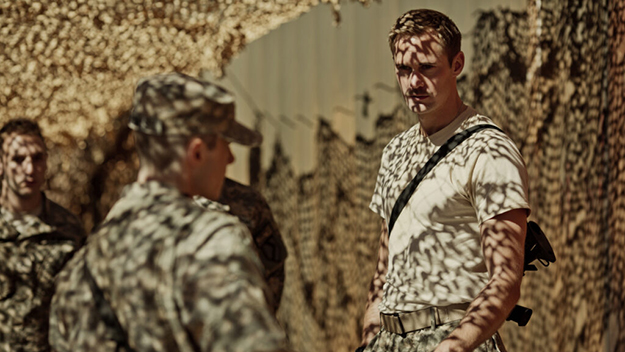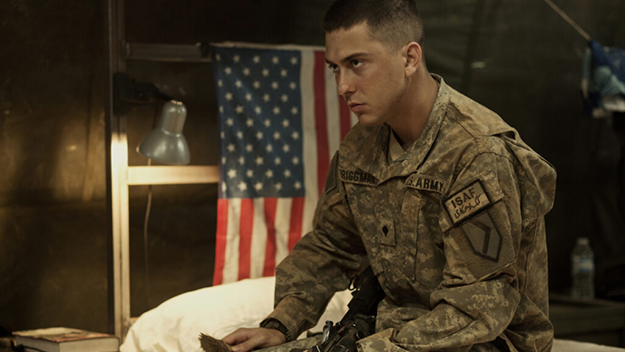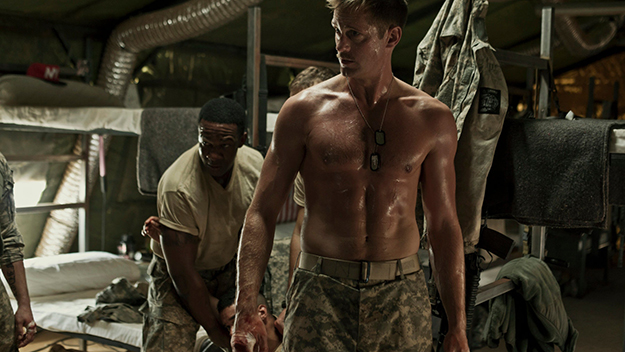Deep Focus: The Kill Team

Writer-director Dan Krauss, in his gutsy first feature, The Kill Team, puts a revelatory speech in the mouth of a gung-ho soldier named Rayburn (Adam Long) as he relaxes at an army base in Kandahar after gunning down a blameless Afghan teenager. Platoon-mate Andrew Briggman (Nat Wolff) knows that Rayburn is part of a plan to kill innocent civilians as a sociopathic sport, a rite of passage, and a statement that American troops can get away with anything. When Briggman asks Rayburn how he feels after his first kill, Rayburn’s answer serves as an oblique confession: Rayburn says his father once explained that when the Union Army executed spies, one member of the firing squad got a gun with an empty round, known as “the conscience round.“ We might think that helped to allay the riflemen’s moral qualms over acting as executioners. But to Rayburn, a freshly minted killer, the practice was meant to unite them all in sanctioned murder. Any one shooter might not have taken the fatal shot. As a group they definitely did. Rayburn tells Briggman that once a soldier sets aside his personal sense of right and wrong—realizing that his squad is responsible for the body count—it’s easy to kill anyone.
The creation of that mindset is the subject of The Kill Team. It’s a harrowing, fictionalized account of the “Maywand District murders” of at least three unarmed Afghan citizens by a single platoon between June 2009 and June 2010. In beautifully crafted vignettes, we see the ruthless, wily ringleader—here named Deeks (Alexander Skarsgård)—assume command from a humane staff sergeant blown up by an IED. Deeks, a fortysomething veteran of three tours in Iraq and Afghanistan, exploits his college-age soldiers’ grief, fury, and fatigue, and their inability to connect with the Afghan people or environment. He milks the platoon’s frustration at being asked to “build relationships”—something soldiers are not trained for—rather than act like “warriors.”
Deeks rouses his squad’s latent bloodlust and ever-present paranoia to justify, for example, slaughtering a random noncombatant and then framing him by planting a used weapon on the body. Their criminal tradecraft wouldn’t pass muster in any decent TV cop show, including concocted cover stories about civilian Afghans suddenly setting off grenades. In Deeks’s racist eyes, his victims are sub-humans who cooperate with the Taliban: he says Afghans don’t admit to planting IEDS or knowing their locations but somehow manage to avoid stepping on the devices themselves. Whether Deeks’s minions terminate a helpless boy, a terrified family man, or a stoic mullah, the sergeant fantasizes that he’s trading a dead Afghan for ten live Americans. Deeks supplies the planted weapons from his own private stash. He encourages his guys to beat prisoners to a pulp. He severs fingers from Afghan corpses and keeps them in a box. He also acts like the cool hard-guy dad of young grunts’ dreams, vowing to get them higher quality dope for their supposedly forbidden hash parties and sealing their closeness with homey rituals like steak cookouts. He carries himself as a paragon of manliness and dares them to meet his standards of brutality. He says he considers them his family, but he orders his crew to gang up on any one of them who breaks the code of silence about his latter-day bushwhacking.

Krauss, a former photojournalist and documentary-maker, made an excellent 2015 documentary with the same name and subject. Krauss based the earlier Kill Team on extraordinary interviews filmed in a disarmingly up-close and personal style. (There’s no interview with the sergeant, whose actual name is Gibbs.) Krauss focused on the inspiration for Briggman’s character, Adam Winfield, as he and his parents prepared for his military trial. We learn that Winfield alerted his father early on, who tried and failed to rouse the Army into action, then backed off because his son feared retribution. The same happens in the feature. But part of the documentary’s power comes from its evocation of Winfield’s existential confusion. We’re jolted to learn that the boy-man who asked his father to help him stop the homicides did discharge his weapon during the platoon’s third murder. He contends that his target was dead before he took a shot and that he aimed away from him anyway. But we wonder whether his anguish and depression stem partly from a sense of guilt. We’re startled that a fellow soldier, not Winfield, takes credit as the whistleblower, having triggered the disclosure of atrocities when he called out the Kill Team for its hash parties. The shocks and dislocations we experience along the way emphasize Winfield’s struggle to maintain moral clarity within the fog of war.
There’s nothing foggy about this version of The Kill Team. The feature thrives on strong emotion, a crystalline lucidity, and an uncommon, intimate sweep. It’s apt that one of its production companies is “Nostromo Pictures.” Briggman, our tortured protagonist, leads us into a Conradian heart of darkness where Deeks functions as an all-American Kurtz. Skarsgård is as deft at surrogate parenting as he is at macho posturing. He sports a “Bad Hare Day” apron as he flips the meat on a grill. He smiles and mutters “Caveman” with an admiring inflection when Briggman says he likes his steaks “bloody.” He mocks Briggman’s ex-Marine father for being a desk jockey and treats the teenager with a put-on tenderness that starts out seductive and ends up devilishly creepy.
Wolff matches Skarsgård’s baneful charisma with his own magnetic translucence. Briggman enlists as an idealist. We can see that his go-getting innocence won’t serve him well in a booby-trapped landscape. He’s too eager and insecure to bond in any healthy way with the overgrown mean boys who fill the barracks. Wolff makes him too open to influence. Deeks sees him with a Civil War book and convinces him that he can be part of making history instead of reading about it. When Deeks says he’ll promote him over a bruiser named Marquez (Brian Marc) as long as Briggman wrestles his rival and puts him on his back, Briggman displays just enough low cunning and killer instinct to win the match. Marquez is this film’s equivalent of the whistleblower. When Deeks and his inner circle beat Marquez for his betrayal, Briggman is mostly relieved that it’s not him—though their sadism toward a squad mate is almost as alarming as their anti-Afghan mayhem. Deeks tells Briggman, “You’re trying to do what you think is right. The problem is, you don’t even know what right means.” He’s not wrong.

Rob Morrow delivers a moving, self-effacing performance as Briggman’s real dad. He’s one of those doting fathers we see in human-interest TV spots—the kind who calls his son his hero. Sneaking a smoke with Andy the night before he’s set to fly 7,410 miles away, the older Briggman murmurs, “Being a part of something like this is a tremendous thing.”
Krauss reveals his vast talent and suggests ample potential by locking us into his characters while nailing each locale, whether it’s a spotless suburban street, a funky mess hall, or Afghan adobes. (The movie was shot in Spain.) Krauss’s cinematographer, Stéphane Fontaine, syncs the camera to Briggman’s movements without ostentation. When Fontaine does employ purely subjective shots, the effect on us is devastating. It’s as if we’ve marched for miles in his combat boots.
The movie aims for eloquence—not the tragic grandeur of De Palma’s great Casualties of War (1989)—and it hits the mark. In its finest moments, performance, writing, and direction come together with chilling limpidity. At one point, Deeks sits at the foot of Briggman’s lower bunk. “Leave me alone,” the young man says. In an unsettling, claustrophobic two shot, the sergeant gently places his right hand on the back of the boy’s neck and whispers: “You are alone.”
Michael Sragow is a contributing editor to Film Comment and writes its Deep Focus column. He is a member of the National Society of Film Critics and the Los Angeles Film Critics Association.







